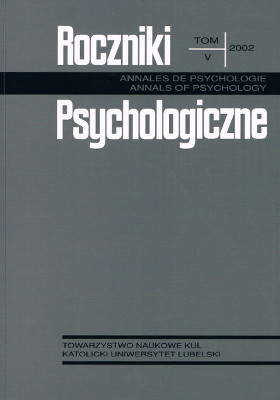Linguistic inference and the process of narrative text reception
Abstract
In the article theoretical considerations are presented that are supported by results of an empirical study of the ways of including linguistic inference processes into the process of understanding the text (e. g. Thomdyke, 1976). Also the discussion has been referred to that has been going on in the literature. It concerns the question of inborn character of the logic of the mind (e. g. Braine, 1994) vs. the ability to construe mental models of the meaning of situations described in the text (Johnson-Laird, 1983). The kinds of linguistic inference most often presented in the literature are shown. and the function of linguistic knowledge and knowledge concerning the world that limit the process of forming potentially possible inferences, are presented. Also empirical studies are shown that illustrate the fact that insufficiencies of the ability to infer make it difficult to construe a coherent mental representation of the text of the story.
References
Austin, J. L. (1970). Quand dire c 'e st fa ire . Paris: Seuil.
Baddeley, A. D. (1981). The concept of working memory: A view of its current state and probable future development. Cognition, 10, 17-23.
Braine, M. D. S. (1978). On the relation between the natural logic of reasoning and standard logic. Psychological Review, 85, 1-21.
Braine, M. D. S. (1994). Mental logic and how to discover it. W: J. MacNamara, G. E. Reyes (red.), The logical foundations of cognition. New York-Oxford: Oxford University Press.
Bransford, J. D. (1979). Human cognition. Learning, understanding, and remembering. Belmont, CA: Wadsworth.
Bransford, J. D., Franks, J. (1971). The abstraction of linguistic ideas. Cognitive Psychology, 2, 331-350.
Bransford, J. D., Johnson, M. K. (1972). Contextual prerequisities for understanding: Some investigations of comprehension and recall. Journal of Verbal Learning and Verbal Behaviour, 11, 717-726.
Bruner, J. (1978). Poza dostarczone informacje. Warszawa: PWN.
Carpenter, P. A., Just, M. A. (1977). Reading comprehension as eyes see it. W: M. A. Just, P. A. Carpenter (red.), Cognitive processes in comprehension. Hillsdale, NJ: Erlbaum.
Ehrlich, K. (1980). Comprehension of pronouns. Quarterly Journal of Experimental Psychology, 32, 247-255.
Fodor, J. A., Fodor, J. D., Garret, M. F. (1975). The psychological unreality of semantic representations. Linguistis Inquiry, 6, 515-531.
Garrod, S., Sanford, A. J. (1985). On the real-time character of interpretation during reading. Language and Cognitive Processes, 1, 43-59.
Glanzer, M., Fischer, B., Drofman, D. (1984). Short-term storage in reading. Journal of Verbal Learning and Verbal Behavior, 23, 467-486.
Grice, H. P. (1975). Logic and conversation. W: P. Cole, J. L. Morgan (red.), Syntax and semantics: Speech Acts, 2. New York: Academic Press.
Harris, R. J. (1981). Inference in information processing. W: G. H. Bower (red.), The psychology of learning and motivation (vol. 15). New York: Academic Press.
Haviland, S. E., Clark, H. H. (1974). What’s new? Acquiring new information as a process in comprehension. Journal of Verbal Learning and Verbal Behaviour, 13, 512-521.
Johnson-Laird, P. N. (1983). Mental models. Cambridge, MA: Harvard University Press.
Johnson-Laird, P. N., Byrne, R. M. J. (1989). Only reasoning. Journal of Memory and Language, 28, 313-330.
Kintsch, W. (1974). The representation of meaning in memory. Hillsdale, NJ: Erlbaum.
Kintsch, W., van Dijk, T. A. (1978). Toward a model of text comprehension and production. Psychological Review, 85, 363-394.
Kintsch W., van Dijk, T. A. (1983). Strategies of discourse comprehension. New York: Academic Press.
Kliś, M. (2001). Alternatywne teorie rozumowania dedukcyjnego. Edukacja Filozoficzna, 31, 278-301.
Kliś, M. (2 0 0 la). Rodzaje wnioskowania lingwistycznego aktywizowane w procesie recepcji tekstu (w druku).
MacNamara, J. (1993). Logika i psychologia (tłum. M. Zagrodzki). Warszawa: PWN.
McKoon, G., Ratcliff, R. (1986). Inferences about predictable events. Journal of Experimental Psychology: Learning, Memory and Cognition, 12, 82-91.
Nicol, J., Swinney, D. (1989). The role of structure in coreference assignment during sentence comprehension. Journal of Psycholinguistic Research, 18, 5-20.
Oakhill, J. (1982). Constructive processes in skilled and less-skilled comprehenders. British Journal of Psychology, 73, 13-20.
Oakhill, J. (1983). Instantation in skilled and less-skilled comprehenders. Quarterly Journal of Experimental Psychology, 35 A, 441-450.
Oakhill, J., Yuill, N. (1996). Higher order factors in comprehension disability: Processes and remedation. W: C. Comaldi, J. Oakhill (red.), Reading comprehension difficulties. Processes and intervention. Maswah, NJ: Erlbaum.
Poissant, H. (1990). Inferential processes in the comprehension of short narratives. W: Van In Lier (red.), Communication & cognition. Belgium: Literacy Acquisition, s. 129-146.
Reder, L. M. (1980). The role of elaboration in the comprehension and retention of prose. A critical review. Review of E ducational Research, 50, 5-53.
Rickheit, G., Schnotz, W., Strohner, H. (1985). The concept of inference in discourse comprehension. W: G. Rickheit, H. Strohner (red.), Inferences in text processing. North-Holland: Elsevier Science Publishers B. V.
Rips, L. J. (1983). Cognitive processes in propositional reasoning. Psychological Review, 90, 38-71.
Sanford, A. J. (1989). Component processes of reference resolution in discourse. W: N. Sharkey (red.), Advances in cognitive science. New York: Ablex Publishing Corporation.
Sanford, A. J. (1990). On the nature of text driven inference. W: D. A. Balota, G. B. F. D ’Arcais, K. Rayner (red.), Comprehension pro c e sse s and reading. Hillsdale, NJ: Lawrence Erlbaum Associates.
Searle, J. (1972). Les actes de langage. Paris: Herman.
Singer, M. (1979). Processes of inferences in sentence encoding. Memory and Cognition, 7, 192-220.
Singer, M. (1980). The role of case-filling inferences in the coherence of brief passages. Discourse Processes, 3, 185-201.
Thorndyke, P. W. (1976). The role of inference in discourse comprehension. Journal of Verbal Learning and Verbal Behavior, 15, 437-448.
Van Dijk, T. A., Kintsch, W. (1983). Strategies of discourse comprehension. New York: Academic Press.
Copyright (c) 2002 Roczniki Psychologiczne

This work is licensed under a Creative Commons Attribution-NonCommercial-NoDerivatives 4.0 International License.


